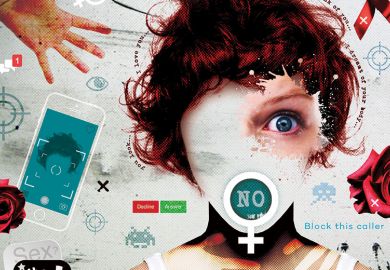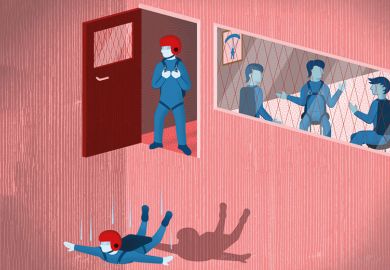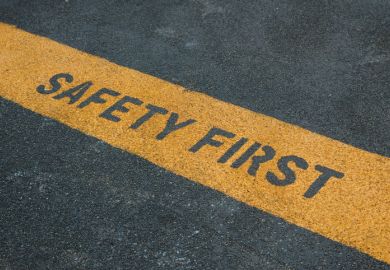Students nowadays, eh? With all their safe spaces and trigger warnings, all their righteousness and expectations to be pandered to, all their inability to take things as literature rather than violence. How will they cope in the real world?
I hate that final point the most. The utter smugness of it. As if universities somehow exist outside the real world. Students’ demand for accessibility and representation pisses people off because it’s an insistence that we bring into what purports to be a purely intellectual space the fact of real people with their bodies and their disabilities and their sexualities and all the myriad embarrassments of being human.
But flagging that a text could be upsetting does not somehow make it upsetting; it does not change the text. It just warns people who might be taken unawares. And it reminds everyone else that although they might not personally be disturbed, others might be. It acknowledges that real people are simply not capable of transcending their circumstances and experiences to think purely rationally.
Learning to read well at university necessitates this sort of double sensitivity. You have to recognise what you yourself find interesting and want to respond to, but you also have to recognise the ways in which a text falls, in different contexts and to different people.
But what about the teacher?
Even in the recognition that our students are individuals with lives we do not know about, we are inclined to forget that the person teaching them is, too. Or, at least, that this may have downsides as well as upsides.
You hear all about how so-and-so is such a good teacher because they are a specialist, and how freeing it can be to direct your teaching towards your own areas of research, and this is all true. But what about the things you find hard? Not just academically, although that too: how, if at all, do you admit to your students that you’ve just never really got scansion, or couldn’t actually care less about The Faerie Queene? But also emotionally hard?
Incidentally, I love The Faerie Queene. Its imagination and breadth still take my breath away. I wrote my undergraduate dissertation on its depiction of rape and sexual assault. That was a bigger topic, really, than 7,000 words would allow, but I had to work out how I felt about the way, constantly, Spenser’s women were violated, even metaphorically. I had to.
I was raped, you see.
I was raped by a fellow student while I was an undergraduate.
And I took my finals in the same week as someone I had once loved was tried for raping a 17-year-old. I sat there as if I hadn’t spent the morning refreshing the courtroom website, writing about The Rape of Lucrece as if I were someone with only an intellectualised knowledge of what these things meant. As if it meant I didn’t read it differently.
But of course it did. So if I teach that poem, how do I pretend otherwise? What do I say to my students?
I’m asking this sincerely. I’m a PhD student, still figuring out the boundaries of the classroom. One thing I feel I can bring to teaching is my closeness to where my students are; I can say “here are some things I found useful in my first year” and not sound patronising. At the same time, I worry about the boundary becoming too porous: I don’t want to lose my authority. So I pretend to be entirely rational and studious when it comes to chastising them. I don’t tell them that when I first met my undergraduate supervisor I almost threw up on her.
Last year I taught Shakespeare. Hamlet, inevitably, brings Ophelia and the question of assault. The week before, I warned my two classes (of mostly girls) that we’d probably spend a fair amount of time talking about assault, and that they could come to me in private – even anonymously – if they wanted. And I felt the words heavy on my tongue: “I might find the discussion upsetting, too.”
But I didn’t say them.
The students obeyed my instruction to be courteous to each other, and talked about the topic sensitively. Some of the more outspoken passionately took Ophelia’s side. But I had to sit there as an unbiased arbitrator, asking them to back up their points, unable to point out that I, too, was a body in the room who wanted their kindness.
Would it have changed the class, if I had? Of course. You say I was raped and you change yourself and the dynamics of the conversation, at least when it comes to sexual assault. Maybe they wouldn’t have had some of the discussions they did, for fear of upsetting me. Maybe they would have tried too hard to play up to my view, to curry favour by demeaning Hamlet. Maybe I would have upset the balance too much, in all the ways you’re not supposed to.
But then again...
The people reading your essays, I tell my students, are all people, with opinions about the texts that are impossible to fully put aside. Often this translates into exam advice: don’t give someone reading however many scripts an hour any reason to mark you down. Sometimes it comes as advice about reading literary criticism for the first time: remember that people are writing with agendas, within wider academic movements, for certain purposes.
So why don’t we tell our students the same thing about us?
That we are people, too?
Alice Wickenden is a PhD student in English at Queen Mary University of London.
Register to continue
Why register?
- Registration is free and only takes a moment
- Once registered, you can read 3 articles a month
- Sign up for our newsletter
Subscribe
Or subscribe for unlimited access to:
- Unlimited access to news, views, insights & reviews
- Digital editions
- Digital access to THE’s university and college rankings analysis
Already registered or a current subscriber?








